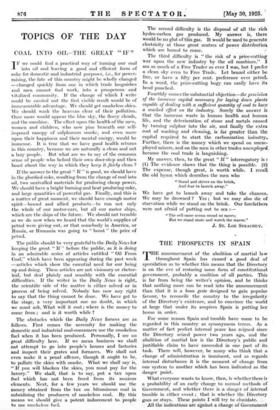TOPICS OF THE DAY
• COAL INTO OIL—THE GREAT " IF "
IF we could find a practical way of turning our coal into oil and leaving a good and efficient form of coke for domestic and industrial purposes, i.e., for power- raising, the fate of this country might be wholly changed —changed quickly from one in which trade languishes and men cannot find work, into a prosperous and vitalized community. If the change of which I write could be carried out the first visible result would be of immeasurable advantage. We should get smokeless skies. We should wash the heavens clear of their pollution. Once more would appear the blue sky, the fleecy clouds, and the sunshine. The effect upon the health of the men, women and children, who now pine beneath our self- imposed canopy of sulphurous smoke, and even more upon their happiness and their mental energy, would be immense. It is true that we have good health returns in this country, because we are naturally a clean and not a lazy people. But what are we to say of the common sense of people who befoul their own door-step and then boast about the way in which they keep it fairly clean ?
If the answer to the great " If " is good, we should have in the glorified coke, resulting from the change of coal into oil, two unrivalled materials for producing cheap power. We should have a bright burning and heat producing coke, and large quantities of powerful gas. Finally, and this is a matter of great moment, we should have enough motor spirit—benzol and allied products—to run not only the whole of our motor-cars, but all our motor ships, which are the ships of the future. We should not tremble as we do now when we heard that the world's supplies of petrol were giving out, or that somebody in America, or Russia, or Rumania was going to " boost " the price of petrol.
The public should be very grateful to the Daily News for keeping the great " If " before the public, as it is doing in an admirable series of articles entitled " Oil From Coal," which have been appearing during the past week —articles which show the essential need for our being up and doing. These articles are not visionary or rhetor- ical, but deal plainly and sensibly with the essential difficulties. If the writer in the Daily News is right, the scientific side of the matter is either solved or in process of being solved. Nobody has now any right to say that the thing cannot be done. We have got to the stage, a very important one no doubt, in which we must ask, What will it cost ; where is the money to come from ; and is it worth while ?
The obstacles which the Daily News forsees are as follows. First comes the necessity for making the domestic and industrial coal-consumers use the smokeless fuel when it has been produced. Personally, I see no great difficulty here. If we mean business we shall not attempt to go into people's houses and factories and inspect their grates and furnaces. We shall not even make it a penal offence, though it ought to be, to pollute the skies with smoke. What we shall say is, " If you will blacken the skies, you must pay for the luxury." We shall, that is to say, put a tax upon fuel which has not been freed from its noxious elements. Next, for a few years we should use the money obtained from the tax on bituminous coal in subsidizing the producers of smokeless coal. By this means we should give a potent inducement to people to use smokeless fuel. The second difficulty is the disposal of all the rich hydro-carbon gas produced. My answer is, there would be no glut of this gas. It would be used to generate electricity at those great centres of power distribution which are bound to come.
The third difficulty is " the risk of a price-cutting war upon the new industry by the oil combines." I am as much of a Free Trader as ever I was, but I prefer a clean sky even to Free Trade. Let benzol either be free, or have a fifty per cent. preference over petrol. In a word, the price-cutting bogy can easily have its head punched.
Fourthly comes the substantial objection—the provision of the immense capital necessary for laying down plants capable of dealing with a sufficient quantity of coal to have a marked effect on the industry. Surely the answer is that the immense waste in human health and human life, and the deterioration of stone and metals caused by turning sulphur into the air, and finally the extra cost of washing and cleaning, is far greater than the capital required to start the carbonization industry. Further, there is the money which we spend on unem- ployed miners, and on the men in other trades unemployed, because the coal trade is languishing.
My answer, then, to the great " If " interrogatory is : (1) The evidence shows that the thing is possible. (2) The expense, though great, is worth while. I recall, the old hymn which describes the men who
" Stand and shiver on the brink, And fear to launch away."
We have got to launch away and take the chances. We may be drowned ? Yes ; but we may also die of starvation while we stand on the brink. Our forefathers were not afraid of putting out to sea :— " The self-same ocean round us raves ;
But we stand mute and watch the waves."
J. ST. LOE STRACHEY.










































 Previous page
Previous page